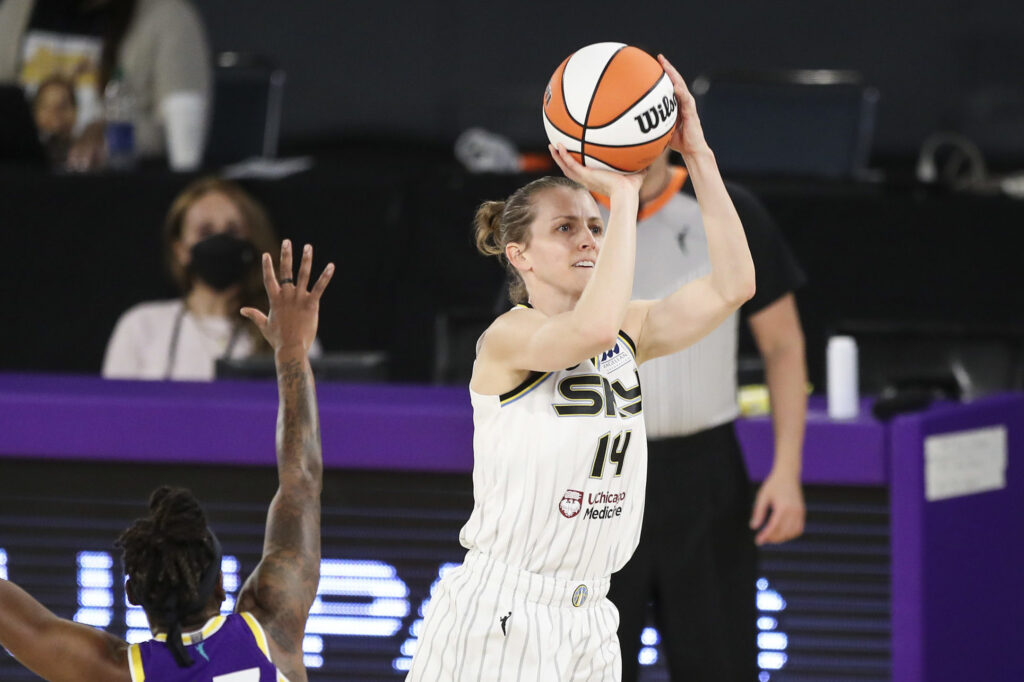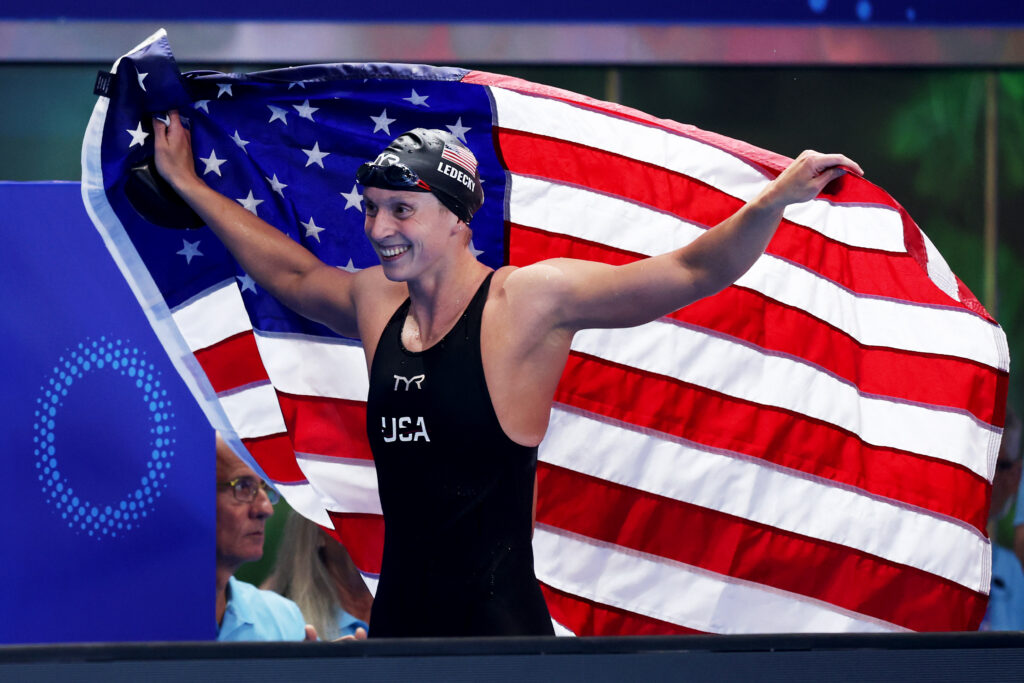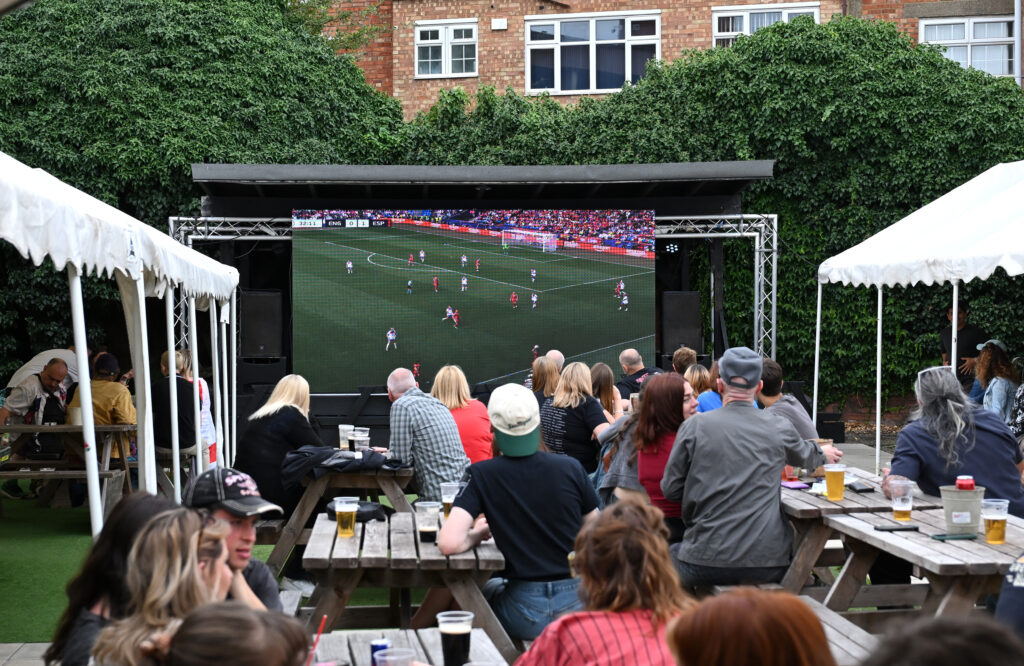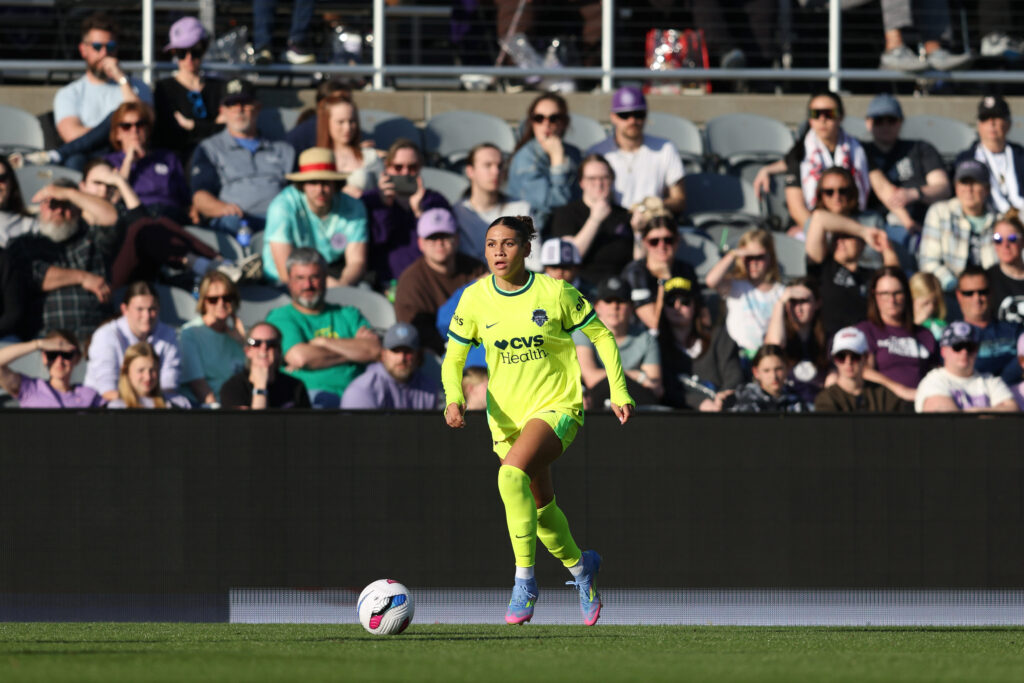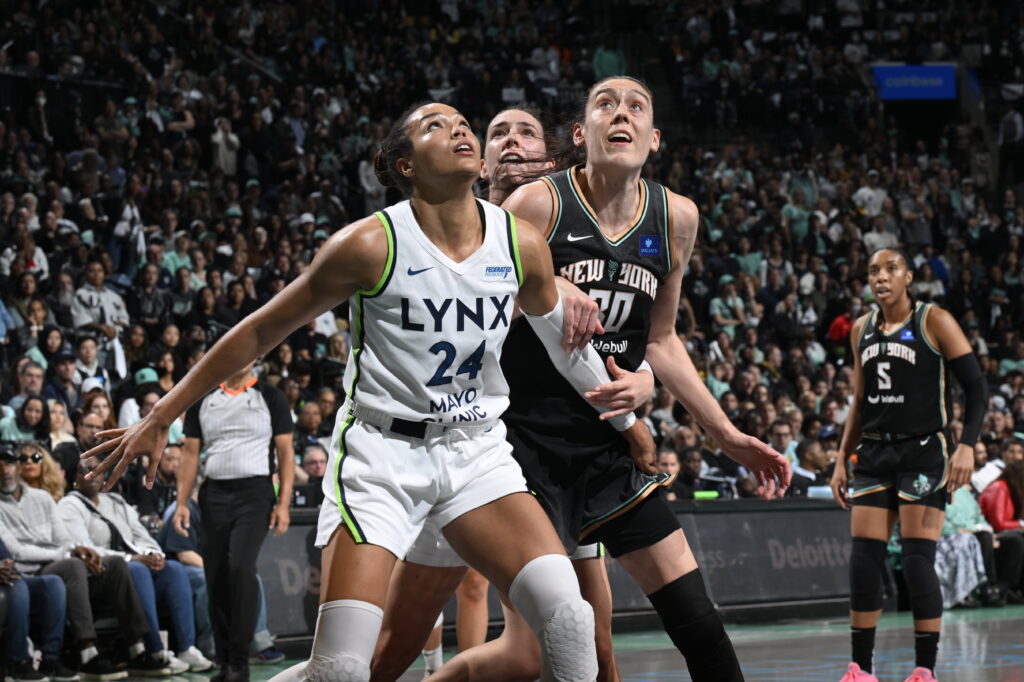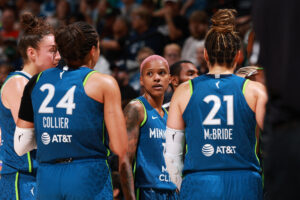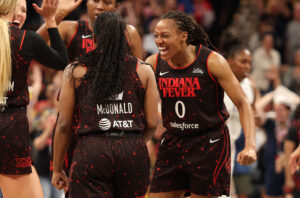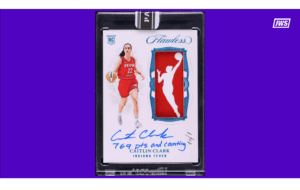Allie Quigley lifted the championship trophy in front of a packed arena in July after winning the 3-Point Contest during the WNBA All-Star Game in Las Vegas. The longtime Chicago Sky guard hit shot after shot from beyond the arc, making it look easy and effortless on her way to claiming the title for the third time.
Quigley’s success in the contest has become so automatic that players joked in Las Vegas that the league should name it after her.
“I’m just not surprised at all by her,” says Sky center Stefanie Dolson. “If she’s not making shots in a game, we’ll have a last-minute shot or a last-chance play to win a game, and we’ll still go to Allie. She is one of the greatest shooters. We always have the most confidence. So even during that 3-point contest, I was like, she’s still got it.”
In her 13th WNBA season, Quigley certainly still has it. Connecting on a career-high 45.4 percent of her 3-point shots during the regular season, she posed a constant scoring threat whether she started or came off the bench. She helped the Sky turn around their season after a 2-7 start to earn the No. 6 seed in the playoffs, where they’ll face the Dallas Wings in the first round Thursday.
It’s hard to imagine that a sharpshooter as calm and effective as Quigley struggled to get a foothold in the WNBA. But there was a time when the 35-year-old wondered if she’d ever find her place in the league, when she lacked confidence in her abilities.
In 2008, when the Seattle Storm drafted her in the second round out of DePaul, Quigley was so excited to hear her name called that she didn’t consider the next steps.
“I didn’t know too much about the team. Didn’t really know much about the coach or the process involved, either,” Quigley says. “You’re a little bit naïve to think, I’m drafted so I’m on the team. Then, the more you look at the roster and you get to camp, you realize, OK, I really have to make this team. And it’s looking like it’s going to be pretty hard to do that actually.”
Landing in the right situation means everything for a draft pick in a 12-team league where roster spots are limited. For Quigley, being in Seattle meant sitting behind veteran players who already had defined roles with the team.
During 2008 training camp, then Storm head coach Brian Agler had Quigley playing backup point guard. It was a position she wasn’t used to after a standout four-year career at DePaul, where she graduated as one of only four players to score 2,000 career points. But Quigley did her best to soak up professional basketball knowledge and be flexible while learning a whole new system in order to stick with the team.
It didn’t work. Just before the start of the season, the Storm waived Quigley. From there, she landed with the Phoenix Mercury as a free agent but was cut the next season. In 2010, she had brief stints with the San Antonio Stars and the Indiana Fever. She returned to Seattle in 2011, appearing in only seven games.
When Quigley showed up for Storm training camp in 2012, her mind was in Europe, where she’d found success playing in Hungary and in the EuroLeague.
“I was contemplating getting my Hungarian passport to play overseas for the year or to try and make the Storm roster,” Quigley says. “I was feeling good about my chances, but the passport was going to help me out with getting better basketball opportunities over in Europe.
“I talked to Brian about it, and he knew the European process and the league, and he said, ‘I think you need to get the passport and we’ll keep you in mind.’ Went and got the passport, was in Hungary for a month or two, and Seattle never called back.”

In 2012, as the WNBA season continued on without her, Quigley played basketball overseas. At the time, she was dealing with confidence issues and questioned whether she was good enough to play in the WNBA.
Quigley comes from a basketball family. She spent her childhood playing with her brothers and sister in the backyard or at the YMCA in their hometown of Joliet, Ill. They grew up loving the game. So it was hard for them to watch Quigley struggle when they knew how hard she was working.
“We Skyped a lot, just talked about like, what are some other things [she] could be doing?” says Quigley’s younger sister, Sam. “Coaches would sit her down and say, ‘You’re doing everything right, you had a great training camp, but we’re gonna cut you.’ And she was like, ‘Wait, I don’t understand.’
“I remember her saying that she sat down with Agler and just said, ‘Why? Can you just tell me why?’ And he gave her some truths and probably some pretty blunt answers of things she needed to improve on.”
While playing in Europe, Quigley focused on ball-handling, reading pick and rolls, learning how to score off the pick and knowing when to shoot or pass. The more experience she gained overseas, the more confident she felt. When she went up against players in the WNBA, she realized she could not only hold her own but flourish.
Others noticed her improvement, too. Pokey Chatman was the head coach of Russian basketball club Spartak during Quigley’s early years in the WNBA. Although her team never played against Quigley, Chatman kept a close eye on the guard. She liked what she saw in her and, as the head coach of the Chicago Sky by that time, she wanted Quigley on her team.
“I was watching her game evolve, not just watching the stats and highlights, and watching her compete and not just be a catch-and-shoot player,” Chatman says. “Her handles were getting better, everything. It was a no-brainer.”
For Chatman, seeing Quigley’s basketball evolution in real time was the difference. It also helped that there was a fit in the Sky’s system.
“I think some people hear that a player bounced around and think, oh, that’s never gonna work,” Chatman says. “I just saw this silent assassin-type mentality, like her emotions very seldom changed. She just knocked down shots. I always said, ‘If you can space the floor, you have a shot to have some success.’ And that was the initiating factor in it — adding someone who had some pro experience, a little bit of grit and a chip on her shoulder, like, ‘Sh—, this is my last go-round, I’m gonna make this happen.’
“And that was the beginning of Allie having a beautiful impact on the Sky program.”
Quigley spent her first season with the Sky on the bench. She averaged only 9.4 minutes per game in 2013 but tried to make an impact whenever she got on the floor. Chatman was still feeling her out as a player at the time, but told her she’d have a bigger role the following season.
In 2014, Quigley’s minutes jumped up to 24.8 per game. She took full advantage, averaging 11.2 points, 2.2 rebounds and 1.9 assists per game on 47.2 percent shooting from the field and earning the Sixth Woman of Year award. In 2015, she repeated the same production off the bench and won the award again.
Her career hasn’t waned since.
Quigley became a full-time starter in 2017 and was voted to her first All-Star Game. Now in her ninth year with the Sky, she’s one of the best 3-point shooters in the history of the league, ranking fifth all-time with a 39.9 3-point percentage.
Quigley’s career renaissance started and very well may end in Chicago. Looking back on her time in Europe, Chatman giving her an opportunity, winning back-to-back Sixth Woman of the Year awards — even her marriage to Sky teammate Courtney Vandersloot — Quigley can’t help but think it was destined.
“Just having been with different teams before that and thinking about giving it up, just to have that chance to be in Chicago and have my family be at every single game, it was perfect,” she says. “It was meant to be, to know that the previous five, six years of struggles were kind of worth it.”
Those who know Quigley best always believed her WNBA career would pan out.
“We weren’t surprised because of all the success she had growing up. I mean, she was phenomenal in many sports,” Sam says. “For us, it was like, we’re not surprised that Allie did this. What we’re most surprised about is her transformation as a person and as a woman. She’s become a professional.”
“Allie probably knew at some point, ‘I’m a great shooter. It doesn’t matter what else I can or can’t do on the court. I’m really good at shooting and people are gonna need that,’” Dolson adds. “And I’m just glad that Chicago took that chance on her and really committed to her being on the team and has stuck with her for so long.”
Alli3 Quigl3y with 11pts in the 1Q 🔥 pic.twitter.com/YwXD67iHfU
— Chicago Sky (@chicagosky) September 19, 2021
Chatman will always revel in the memory of helping bring Quigley back to the WNBA, and she couldn’t be more proud of the player Quigley has become.
“She deserves it because she’s put in the work. And it’s not just the shooting anymore. That’s what I want people to highlight — she’s not just catch and shoot,” Chatman says. “Of course, she’s a laser. We called her ‘laser.’ But it’s just the evolution of her game to positively impact it in different areas of offensive play. I think it was timing, environment. She just rocked it, and I’m glad she did.”
As the Sky head into the playoffs, Quigley is calm and confident. The days of questioning her skill and place in the WNBA are a distant memory. These days, she has the same belief in herself and her basketball abilities as she does in her teammates.
“We’ve beaten almost every team ahead of us so far. Especially the top three teams,” Quigley says. “So I think we just need to use that confidence, to know that we can do anything.”
Lyndsey D’Arcangelo is a contributing writer at Just Women’s Sports, covering the WNBA. She also contributes to The Athletic and is the co-author of Hail Mary: The Rise and Fall of the National Women’s Football League. Follow Lyndsey on Twitter @darcangel21.
